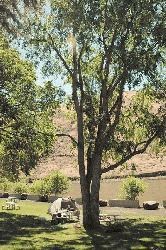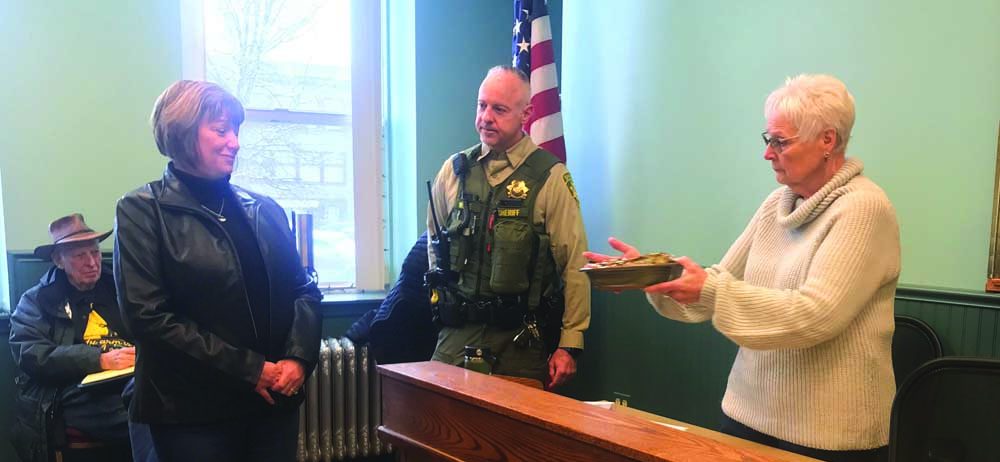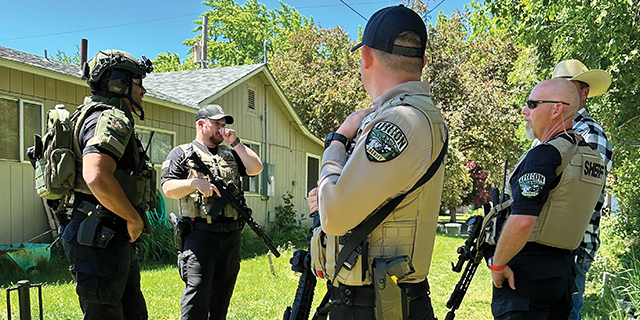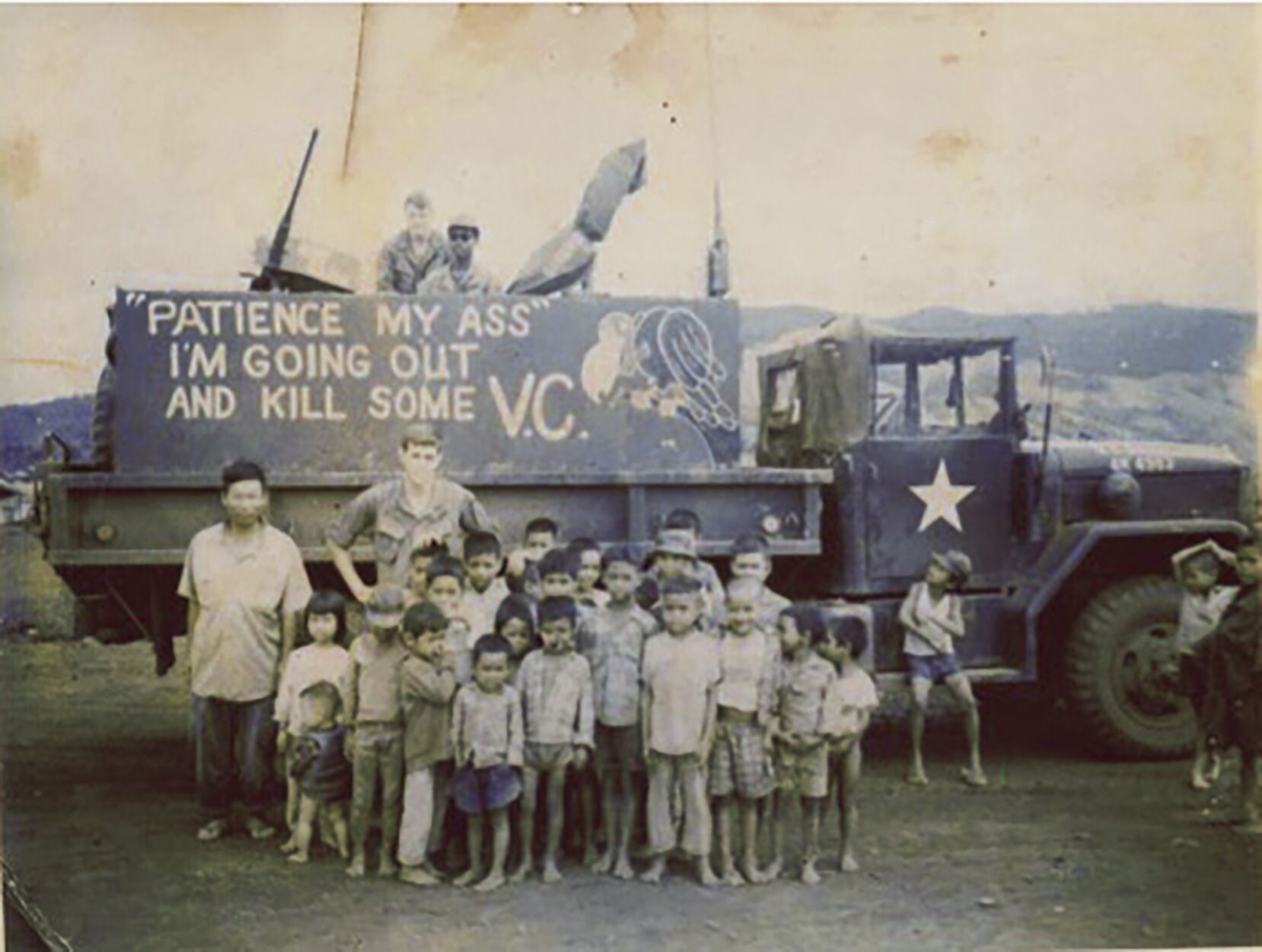Fishing is good, park is better
Published 12:00 am Friday, July 1, 2005

- The tent and day-use areas share green lawns and well-pruned trees that provide cool shade. (Baker City Herald/S. John Collins).
By MIKE FERGUSON
Of the Baker City Herald
RICHLAND Pam DuMars will mark her one year anniversary as Hewitt and Holcomb parks manager today not with a cake and a celebratory bottle of bubbly, but with at least 12 hours of good old-fashioned hard work.
There are bathrooms to be cleaned, twice a day without fail. There are quarters to collect from the pay showers, and flower gardens to weed and water twice a week but only sprinkled on the days that the park’s irrigation water is delivered via an irrigation diversion, every Monday and Thursday.
Most importantly, there are campers to greet and clean up after.
That’s the lifestyle when your home and work are one and the same DuMars and her husband, Bob, who during the day works for Idaho Power Corp., share a mobile home adjacent to the park office.
Daughter Angie Tucker also pitches in to clean the park, run errands, write a newsletter and take care of guests.
andquot;I like this job,andquot; Pam DuMars is quick to point out, andquot;but it’s 24/7. It’s a demanding job.andquot;
By mid-week her reservation book for the summer’s biggest weekend was almost full just two sites remained open, both without hookups. Thirty-seven RV and 13 tent sites were already sold at Hewitt Park, the gateway to one of the Northwest’s great warmwater fishing sites.
(Holcomb Park remains basically a large parking lot with a boat ramp, but plans are on the boards to transform it into an RV and tent camp site by 2009 at the latest.)
Attendance at the parks is up over the previous two years, says Baker County Parks director Lorrie Harvey.
An infusion of cash from the county’s settlement with Idaho Power Corp. over the relicensing of three hydroelectric dams in Hells Canyon and grants from such sources as the State Marine Board will help boost those numbers in years to come, Harvey believes. While revenues from the parks grew from $66,000 to $81,000 between 2003 and 2004, they’re on track to increase about five percent this year, she said.
Guests are responding to clean restrooms, a new fish-cleaning station, good conditions at Brownlee Reservoir, and to aesthetics like flower beds and trimmed trees and fertilized grass.
andquot;It’s clean and it smells good,andquot; Harvey said of the restrooms and especially the fish-cleaning station, which formerly consisted of rotting and smelly wood. The new station has the clean look of stainless steel, and is cleaned daily.
A pair of visitors from Alsea, Carl Martin and his wife, Carmen, don’t even skip a beat cleaning their catfish haul to say they’ve noticed a andquot;100 percent improvementandquot; this year over last year.
They’ve got orders from their neighbors to bring some of the fillets back to Alsea.
andquot;Some of our friends are too old to go clear across the state for catfish,andquot; Carl Martin says, andquot;so we bring some of it back to them.andquot;
Alex Iomita, a Rumanian immigrant who lives in Vancouver, Wash., and was at Hewitt Park to catch crappie with his son, also says he’s noticed andquot;a big differenceandquot; in the park’s appearance.
andquot;Before,andquot; he said, andquot;this used to be a pretty trashy place.andquot;
A really disgusting job
Tucker and DuMars, who was a hairdresser in Halfway before landing the one-year park management contract, usually begin their day between 6:30 and 7 in the morning and don’t close the office until 8 p.m. Some of their jobs are routine enough record-keeping, cleaning the facilities, weeding, fertilizing and watering. But there’s one job nobody likes hauling buckets full of fish remains from the fish-cleaning station in Hewitt Park to a larger bin in Holcomb Park, where they’re trucked to a nearby farmer’s field for use as fertilizer. Two or three days of entrails under the hot sun produces a smell that DuMars says is andquot;worse than anything you’ve ever smelled.andquot;
andquot;Angie won’t do it,andquot; she says with a frown. andquot;I about puke every time I have to.andquot;
Most of her tasks don’t elicit that gut-level response. DuMars takes a visitor on a tour with obvious pride. The restrooms have new roofs, with boards free of mold and no flies buzzing around. New fluorescent lights offer a gentler light than their predecessors.
The fish-cleaning station looks a little like a modern cafeteria, with gleaming stainless steel and happy campers skillfully hacking up the catch from the previous day.
DuMars has improved Hewitt Park’s grounds with small flower beds and a large vegetable garden. She’s arranged for tree-trimmers to prune the trees along the Powder River arm of Brownlee Reservoir that runs the length of the park, which allows for more sunlight and greener grass, which tent-pitchers say they appreciate.
She’s computerized reservations and helped shepherd installation of a new $22,000 filtration system that proved necessary when a new well was dug and the water was brown with excessive iron and magnesium.
New money + marketing = more guests
The county recently learned it had received a $98,000 grant from the Marine Board to extend the boat ramp at Holcomb Park and install more floats near the ramp. The grant will also begin to pay for new septic and electrical systems at Holcomb, with the possibility of $269,000 more from the Oregon Parks and Recreation Commission.
The reason to seek all the funding is simple, Harvey says: too many people who want to stay at Hewitt Park must be turned away because there’s not enough space for them during peak camping season.
Harvey says there are plenty of people responsible for that happy problem. She says that better promotion of the Hells Canyon Scenic Byway has increased the number of park visitors, as has continued tourism marketing efforts by Baker County Unlimited and Travel Oregon, the state’s tourism commission.
DuMars said she and her husband are considering rebidding on the park management contract when it comes up again Jan. 1. She’ll have to convince her husband that living on the premises is the right thing to do for another year.
andquot;I’m a people person, so I’m very happy most daysandquot; on the job, she says. andquot;Lorrie and I and the (parks and recreation) board and I have good working relationships. They listen to most of my ideas and then they pay to make them work.andquot;





